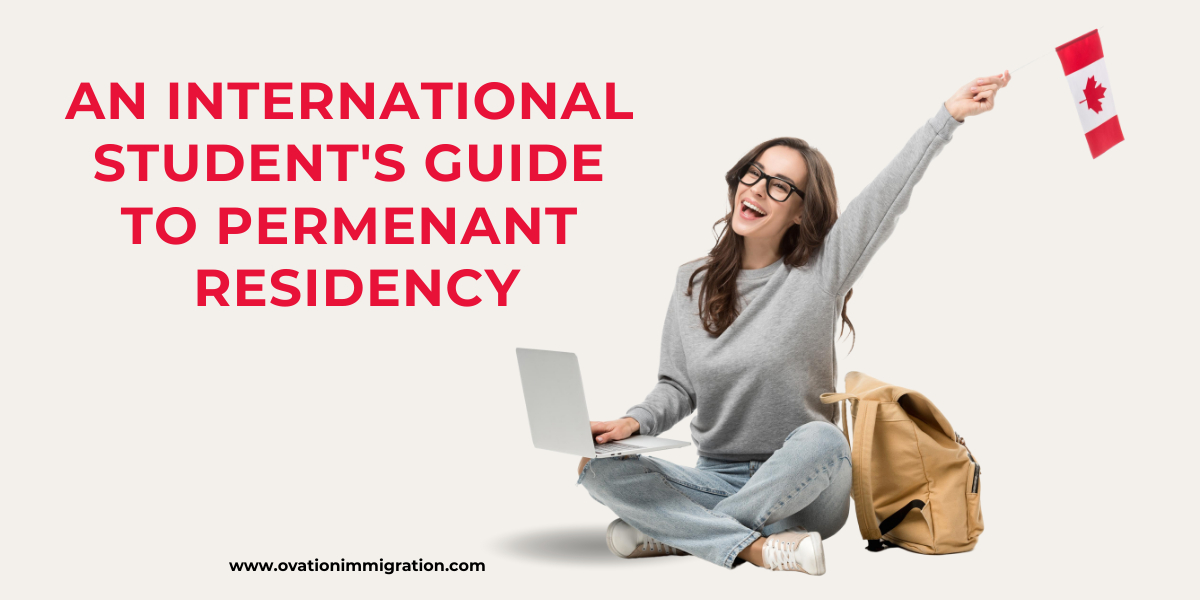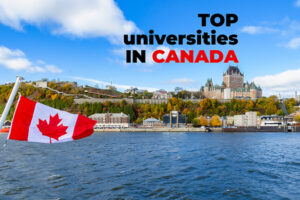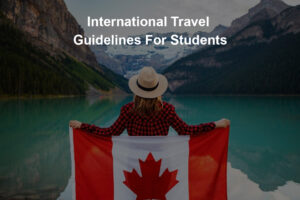Every year thousands of foreign students come to study in Canada as International students, and many aspire to eventually settle down and live in Canada as permanent residents. As per statistics Canada, about 31% of study permit holders transitioned into permanent residents within 10 years of their first study permit. However, 21% were permanent residents within 5 Years.

If you’re interested in immigrating to Canada as permanent residents, but starting your journey as a student, then you may be wondering about the process. This article will cover the steps from student visas to permanent residency in Canada. We’ll also provide tips on planning for your PR as an International Student and what to expect. So if you’re considering moving to Canada as a student or choosing between PR or a Student Visa application read on!
Ovation Immigration’s Unique Solution for International Students
Our unique solution for Study Permit holders allows us to keep an eye on your points and identify how close you are to getting an Invitation (ITA) for Permanent Residency. To get started take a free assessment and keep your profile updated. This allows us to keep you informed about the next steps for a PR application and to get in touch with you when your profile is strong enough to get an invitation to apply (ITA).
1. Land as a Permanent Resident instead of a Student in Canada
Your options at this stage.
A. Express Entry
- Federal Skilled Worker Program (FSW)
- Federal Skilled Trade Program (FST)
Before you apply for a Student Visa we recommend you calculate your individual CRS score and identify if there is any likelihood of getting an Invitation to apply (ITA) based on the previous cut-off points. Alternatively, you may choose to fill out a free assessment form by Ovation Immigration and we will contact you if you qualify for the Express Entry FSW stream.
Should you apply for a PR or Student Visa?
Statistics Canada’s tuition fee report shows that an international student pays 2.84% more for a graduate program and 5.8% more for an undergraduate program. Permanent residents and Canadian citizens of Canada pay local student fees, therefore it is cost-effective to be a Permanent Resident instead of an International Student. However, a PR application could last for 8 months, 12 months or longer. For that reason, some applicants may prefer to apply for a student visa first, as the process barely takes 2-3 months and can help them to start their studies in Canada more quickly. Whichever option you choose, make sure to research the process thoroughly or consult with us to ensure that you are taking the best route for your individual needs.
Should you apply for both Student Visa & FST or FSW Express Entry PR?
As per Immigration refugees and Citizenship Canada (IRCC), a Student Visa applicant must prove that they will return back to their home country upon completion of their education. If you apply for permanent residence and a student visa at the same time, it is considered dual intent, meaning your application for PR contradicts your intent of returning back to your country. Therefore, the officer has the right to refuse your Student Visa application.
2. PR for Students In Canada – Student Visa to Permanent Resident
Your options at this stage.
A. Express Entry
- Federal Skilled Worker Program (FSW)
- Federal Skilled Trade Program (FST)
International students may apply for Permanent Residency if they are eligible. At this stage, the process is the same as that of an international applicant outside Canada. Typically you would still be applying under FSW Express Entry Stream or FST Express Entry Stream.
PR Rules for International Students In Canada
There are no restrictions in applying for permanent residence status as a student, and no extra points for being an international student in Canada. Additional points are rewarded after you complete at least 1 year of full-time education in an eligible Canadian educational institute.
Suppose you decide to get started on your PR application being a student. In that case, we recommend that you calculate your CRS score and compare it with previous cut-off points to identify the likelihood of a PR Invitation. If you do not have enough points, you must wait until you get your post-graduate work permit (PGWP). More about this is explained below.
PR Requirements for International Students
Typically an international student in Canada does not have Canadian Experience or Canadian Education. Based on the average cut-off points for FSW, a good CRS score is above 460. To get to 460 an international student needs the following.
- ECA Approved bachelor’s and master’s degree.
- Minimum 3 years of work experience in NOC 00, 0, A or B.
- Have a minimum of CLB 9 in CELPIP i.e 7, 7, 7, 8 in IELTS General, and 8 bands in Listening.
- Age less than 30.
Along with IELTS or CELPIP, you may choose to write French Exam (TEF) to get 25 to 50 additional points. Doing this might help you reach the optimum CRS score to maximize your chances of getting an invitation.
3. PR after Study – International Graduate to Permanent Resident
Your options at this stage.
A. Express Entry
- Federal Skilled Worker Program (FSW)
- Federal Skilled Trade Program (FST)
B. PNP (Provincial Nomination Program)
- PNP Express Entry
- PNP Non-Express Entry
Most applicants who do not qualify for PR choose to go the study route. Having Canadian education opens up additional pathways to permanent residence. You may apply for PNP or Express Entry depending on your profile. If you still find yourself behind in qualifying for permanent residence, we want you to know that this is just the beginning, and more opportunities are on your way.
Studying in Canada from a Designated Learning Institute (DLI) qualifies you to apply for a Post Graduate Work Permit (PGWP) and Canadian Experience in NOC 00, 0, A, or B helps you gain up to 70 additional points.
- 1 Year of Education (2 Semesters) = 1 Year of Work Permit (PGWP)
- 2 Years of Education (4 Semesters) = 3 Years of Work Permit
Remember that you can only apply for a post-graduate work permit only once, therefore, you must strategically plan this step in advance. If you have completed 1 year of education in Canada, you could study for another year and combine them to complete 2 years of education in Canada.
PR After 1 Year or 2 Year of Study Program
Having 1 or 2 years of Canadian education rewards you with additional 15 points. These points are a bonus on top of your points for your Level of education, which is usually between 90 – 150 depending on your Canadian + International Education (ECA Approved)
If your overall points are too low consider exploring the Provincial Nomination Program pathway to get 600 additional points in Express Entry. If you do not qualify for the PNP Express Entry category, you could pursue the PNP – Non-Express Entry pathway which is slower than express entry, but you eventually arrive at the same destination. The PNP application process varies based on your province of interest, therefore we recommend that you contact a reliable immigration consultant (RCIC) to explore your PNP options.
PR After 3 Years or More of Studying In Canada
International Graduates who studied in Canada for 3 years or more at a designated learning institute qualify to apply for 3 years of open work permit (PGWP). If your study program was at a University, we recommend that you check with an immigration advisor at your university or contact us to find out if your study program qualifies you to apply for PNP without a Job Offer.
Having a Bachelor’s or Masters’s degree would significantly impact your overall points. An Educational Credential Assessment (ECA) is not required for your educational qualification in Canada.
4. PGWP Open Work Permit to Permanent Residency (PR)
Your options at this stage.
A. Express Entry
- Federal Skilled Worker Program (FSW)
- Canadian Experience Class (CEC)
- Federal Skilled Trade Program (FST)
B. PNP (Provincial Nomination Program)
- PNP Express Entry
- PNP Regular
At this stage, you do not need to have proof of funds to support yourself and your family as long as you have a valid work permit and a job offer. To qualify for the Canadian Experience Class (CEC) and most PNP Programs, you need to have a minimum of 1-year of work experience in NOC 0, 00, A or B.
To apply under the Federal Skilled Trades Program you must have a minimum of 2-year work experience in the Skilled Trades Profession. You also need one of the following: A certificate of qualification from a Canadian Province or a minimum of 1 Year’s Job offer from a Canadian Employer.
PR during or after 1 year of Work Permit (PGWP)
Most students start their permanent residency journey at this stage. Having completed their education and a minimum of 1-year of experience in NOC 00, 0, A or B opens up all popular PR programs for international students in Canada.
If you do not have more than 460 points at this stage, you may still apply and also explore your options to increase your CRS Score.
- Does your Canadian Experience of 1-year help?
- Could you score CLB 9 on the language test for additional 50 points?
- Could you score above 7 in a TEF test along with IETLS?
- Do you qualify for one of the PNP Programs in your province of residency?
- Do you qualify for one of the PNP Programs outside your province of residency?
If you have taken a Free Assessment with Ovation Immigration, you do not need to check this manually, you may choose to update your profile and get in touch to request a consultation.
PR after 2 Years or More of Work Permit (PGWP)
If you have already applied and have received an Invitation to apply, you could apply for a work permit extension (Bridging Open Work Permit) while you wait for the decision on your PR application. If you are waiting to get an Invitation to apply (ITA) or haven’t applied yet. We strongly recommend booking a consultation with a reliable immigration consultant to explore your permanent residency options. Post Graduate Work Permit (PGWP) cannot be extended or re-applied, even if you study again, make the best of it while it’s still valid.




